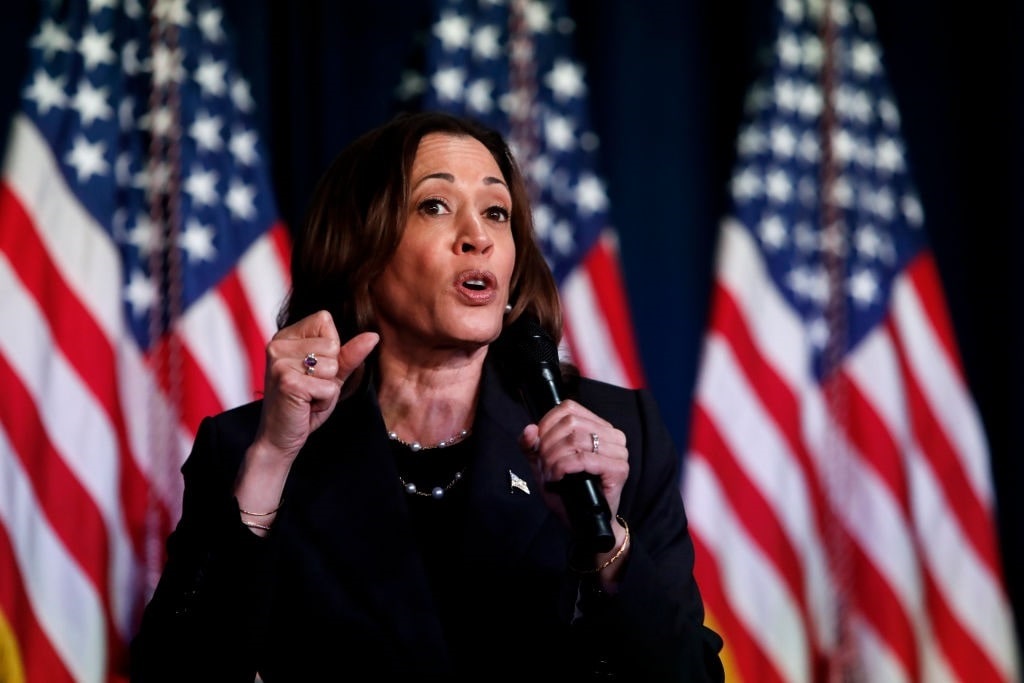All the signs point to Vice President Kamala Harris having the requisite delegate numbers to secure her nomination as the Democratic Party candidate for the November election. Based on an informal survey carried out by the Associate Press, Ms. Harris has surpassed the necessary 1,976 delegates to win a first-round vote at the August 19 convention and avoid a brokered process. However, despite some heavy endorsements from President Joe Biden, former House Speaker Nancy Pelosi (D-CA), and other prominent Democratic governors and politicians, the veep is not yet the nominee. Is it possible she could get pushed aside by another ambitious Democrat?
Replacing Harris
The short answer is yes. Although Harris currently has access to the money already raised for Biden’s re-election and will be able to merge seamlessly into the campaign infrastructure already in place, her nomination to be the Democratic candidate for POTUS is still not a sure thing. Indeed, much can happen between now and next month, when the Democratic National Convention gets underway in Chicago. Former President Barack Obama has so far held back from endorsing Harris, for one, keeping his comments generalized and stating that the Democrats need to ensure they choose an “outstanding nominee.”
In fact, even though the AP presumably has faith in its unofficial survey, the wire service notes that it is “[N]ot calling Harris the new presumptive nominee. That’s because the convention delegates are still free to vote for the candidate of their choice at the convention in August or if Democrats go through with a virtual roll call ahead of that gathering in Chicago.”
It Comes Down to Delegates
To become the Democratic nominee, Harris will need to secure at least 1,986 delegates either at or before the upcoming convention. Around 4,000 will attend the event, and more than 3,800 of them were already pledged and committed to Biden. They are now free to choose the nominee they prefer. Of course, the delegates who were surveyed by AP may change their stance if – as seems likely – other contenders throw their respective hats into the ring. An alternative method of determining the nominee is the much-discussed “virtual roll call,” which would avoid any public infighting and potential chaos at the actual convention. However, critics assert that this option could have the appearance of “back-room dealing” and turn off potential voters who are already unimpressed by not having their primary candidate on the ticket.
Several Democratic heavyweights could make a serious effort to secure the nomination, starting with Illinois Gov. J.B. Pritzker. One of the wealthiest politicians in the the US at the current time, Pritzker has brought Illinois back from the precipice of a fiscal black hole and showed strength at the ballot box with resounding wins to head the Lincoln State. Pritzker has challenged Trump to a “fight” in the past and shows signs of presidential aspirations, funding political organizations that could build serious campaign momentum.
 Next up is North Carolina Gov. Roy Cooper, who boasts a decades-long successful political career in a tough swing state, maintaining a strong economy and high poll numbers. “Coop,” as he’s known to friends, is a viable candidate who could mount a challenge to Harris’ nomination efforts, as could Kentucky Gov. Andy Beshear. He made his name by beating Trump-backed GOP challengers and positioning himself as a champion of the middle class and a Christian, which could appeal to swing state voters and delegates.
Next up is North Carolina Gov. Roy Cooper, who boasts a decades-long successful political career in a tough swing state, maintaining a strong economy and high poll numbers. “Coop,” as he’s known to friends, is a viable candidate who could mount a challenge to Harris’ nomination efforts, as could Kentucky Gov. Andy Beshear. He made his name by beating Trump-backed GOP challengers and positioning himself as a champion of the middle class and a Christian, which could appeal to swing state voters and delegates.
Another individual who could attempt an end-run around Harris is Sen. Mark Kelly of Arizona, a former astronaut who proved his ability to win office in a GOP-dominated state. As a proponent of more gun control – rising into the spotlight following the (non-fatal) shooting of his wife, former Rep. Gabby Giffords – Kelly has emerged as an influential Democrat with a military background.
More remote possibilities include Independent West Virginia Sen. Joe Manchin (who would have to switch back to being a Democrat to get the nomination), Robert F. Kennedy Jr., and Michelle Obama. RFK Jr. is currently pursuing an Independent run but has significant name identification and considerable momentum. Former First Lady Obama who polls well in a head-to-head matchup against Trump, is a longshot possibility. Although she has denied any aspirations, once commenting that it is “not in my soul” to run for high office.
While somebody snatching the nomination from Harris is unlikely, it’s far from impossible. However, anybody running will have to announce soon.
As commentators Ben Kamisar and Alex Seitz-Wald of NBC News explained:
“All it takes to be considered for the Democratic nomination at the convention is a petition with signatures from at least 300 delegates (with no more than 50 from any one state). But the process does not allow draft efforts (the candidate has to sign the petition themselves) so someone would have to declare their intentions to seek the party’s nomination very soon.”
Who is Content to Be Kamala’s VP?
Those with presidential aspirations this cycle might feel slighted by being chosen to only play second fiddle to Harris. But several A-listers could relish the opportunity and bring enormous benefit to a Harris ticket. At the top of the list is Pennsylvania Gov. Josh Shapiro, a strong Biden backer and dogged opponent of Trump. The Keystone State was considered a must-win for Joe Biden’s hopes of re-election, and it remains so for VP Harris. Having Shapiro on the ticket could make a huge difference to the current polling.
AP notes that plans are afoot to hold a virtual roll call beginning next month. While such a process has the advantage of locking down the nominee in advance of the convention, it is not without its drawbacks. Dozens of groups have already indicated that they will attend the event to show their displeasure with the party. They range from organizations protesting the administration’s support of Israel to those who feel the primary process was a DNC-orchestrated operation against the ordinary voter. One might rightly wonder if a behind-closed-doors coronation of Kamala Harris is really in the spirit of openness and democracy the party claims to represent.




